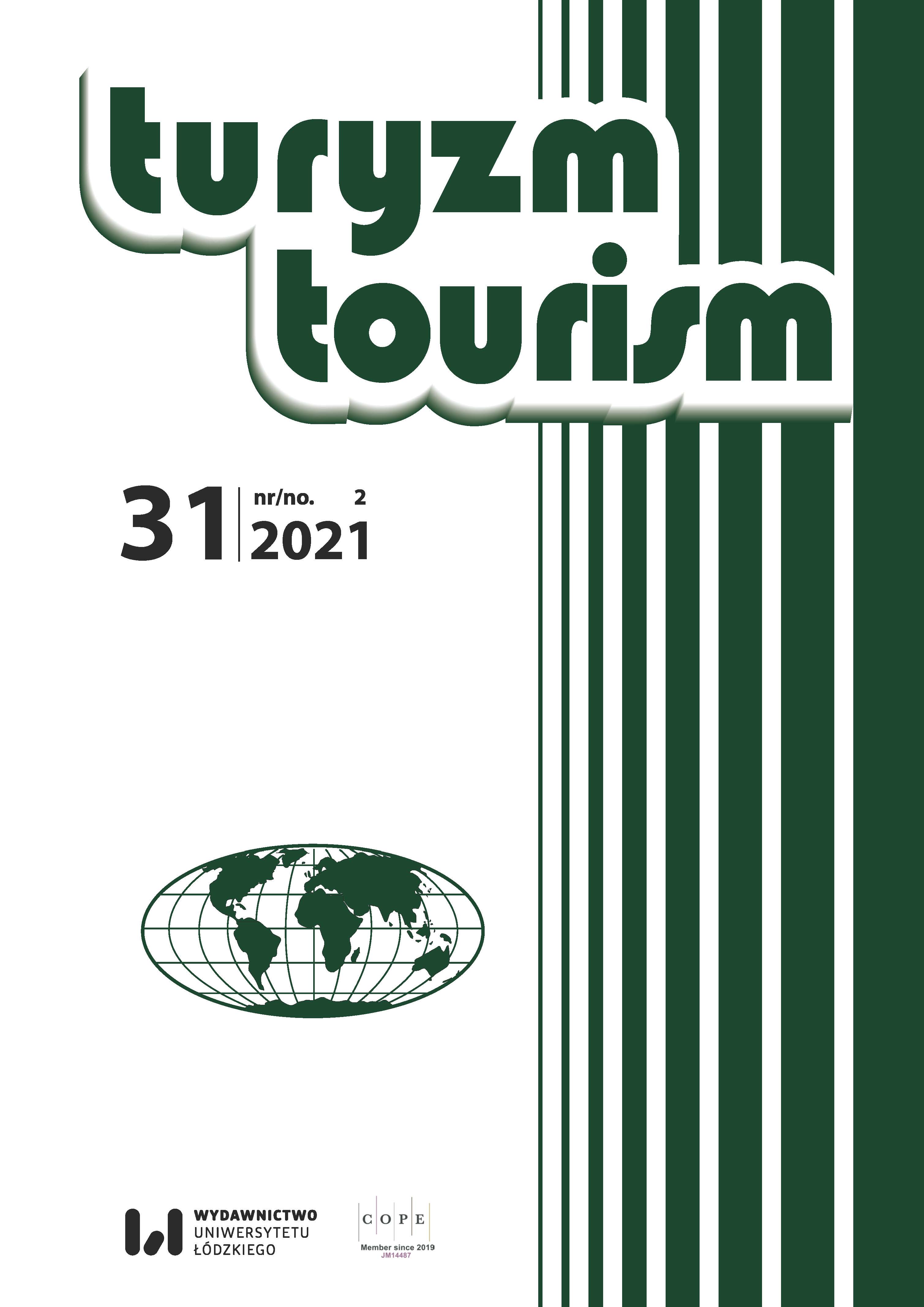The forecasting potential of adaptive models in tourism
DOI:
https://doi.org/10.18778/0867-5856.31.2.10Keywords:
forecasting, adaptive modeling, tourist flows, Holt-Winters methodAbstract
The article discusses forecasting as one of the special scientific research areas which contribute to the assessment of tourist activity development prospects, the identification of key tourism development factors and effective management decision criteria. The study provides an overview of modern research methods used in Russia and other countries for making forecasts in the field of tourism. It aims at assessing the predictive capabilities of adaptive modeling, not frequently used currently in tourism research, for the quantitative analysis of tourist flows using the example of Barcelona, a major urban tourist destination in the pre-pandemic period. An example of a forecast for tourist numbers based on adaptive models is proposed, one of the key indicators showing tourist region success which have proven successful in the study of processes with a dynamic but unstable character.
Downloads
References
Aena (2019). Informes estadísticos. Aena Estadísticas de tráfico aéreo. Retrieved from: http://www.aena.es/csee/ (15.04.2021).
Google Scholar
Alexandrova, A., Aigina, E. (2020). Strategii razvitija turizma v stranah i regionah mira. Moskva: KnoRus.
Google Scholar
Andrianova, E., Golovin, S., Zykov, S., Lesko, S., Chukalina, E. (2020). Obzor sovremennyh modelei I metodov analiza vremennyh ryadov dinamiki protsessov v sotsialnyh, economicheskih I sotsiotekhnicheskih sistemah. Rossiiskii Tekhnologicheskii Zhurnal, 8 (4), 7–45 https://doi.org/10.32362/2500-316X-2020-8-4-7-45
Google Scholar
DOI: https://doi.org/10.32362/2500-316X-2020-8-4-7-45
Atchade, M. (2018). Adaptivnije metody prognozirovanija: Realizatsija v ExCel i programme R. Saint Petersburg: Saint Petersburg State University.
Google Scholar
Atsalakis, G., Atsalaki, I., Zopounidis, C. (2018). Forecasting the success of a new tourism service by a neuro-fuzzy. European Journal of Operational Research, 268 (2), 716–727 https://doi.org/10.1016/j.ejor.2018.01.044
Google Scholar
DOI: https://doi.org/10.1016/j.ejor.2018.01.044
Barchukov, I. (2008). Metody nauchnykh issledovanij v turizme. Moskva: Academia.
Google Scholar
Bosupeng, M. (2019). Forecasting tourism demand: The Hamilton filter. Annals of Tourism Research, 79, 102823 https://doi.org/10.1016/j.annals.2019.102823
Google Scholar
DOI: https://doi.org/10.1016/j.annals.2019.102823
Chekmarev, A.V. (2020). Adaptivnoe modelirovanie intensivnykh i ekstensivnykh sostavlyajuschikh prognoznogo obraza. Sovremennaya Economika: Problemy I Resheniya, 7 (127), 59–69 https://doi.org/10.17308/meps.2020.7/2396
Google Scholar
DOI: https://doi.org/10.17308/meps.2020.7/2396
Chu, F.L. (2014). Using a logistic growth regression model to forecast the demand for tourism in Las Vegas. Tourism Management Perspectives, 12, 62–67 https://doi.org/10.1016/j.tmp.2014.08.003
Google Scholar
DOI: https://doi.org/10.1016/j.tmp.2014.08.003
Davnis, V., Tinjakova, V. (2006). Adaptivnjie modeli: Analiz i prognoz v economicheskih sistemah. Voronezh: Voronezh State University.
Google Scholar
Demin, A., Semenova, Y. (2001). Prakticheskoje ispoljzovanije adaptivnyh modeley v turizme. Kultura Narodov Prichernomoriya, 16, 34–39.
Google Scholar
Ghalehkhondabi, I., Ardjmand, E., Young, W.A., Weckman, G.R. (2019). A review of demand forecasting models and methodological developments within tourism and passenger transportation industry. Journal of Tourism Futures, 5 (1), 75–93 https://doi.org/10.1108/JTF-10-2018-0061
Google Scholar
DOI: https://doi.org/10.1108/JTF-10-2018-0061
Gladilin, V., Gladilin, A. (2016). Regressionnoe modelirovanie i prognozirovanie v turistsko-rekreatsionnom komplekse regiona. Innovatsionnaya Nauka, 4 (1), 117–120.
Google Scholar
Jiao, X., Li, G., Chen, J.L. (2020). Forecasting international tourism demand: A local spatiotemporal model. Annals of Tourism Research, 83, 102937 https://doi.org/10.1016/j.annals.2020.102937
Google Scholar
DOI: https://doi.org/10.1016/j.annals.2020.102937
Khaidi, S., Noratikah, A., Noryanti, M. (2019). Tourism demand forecasting – a review on the variables and models. Journal of Physics: Conference Series, 1366, 012111 https://doi.org/10.1088/1742-6596/1366/1/012111
Google Scholar
DOI: https://doi.org/10.1088/1742-6596/1366/1/012111
Lourenço, N., Gouveia, C.M., Rua, M. (2021). Forecasting tourism with targeted predictors in a data-rich environment. Economic Modelling, 96, 445–454 https://doi.org/10.1016/j.econmod.2020.03.030
Google Scholar
DOI: https://doi.org/10.1016/j.econmod.2020.03.030
Magnus, Y., Katyshev, P., Peresetsky, A. (2004). Ekonometrika: Nachalnyi Kurs. Moskva: Delo.
Google Scholar
Nikolaeva, T., Oreshkina, E. (2016). Determinanty sprosa na vjezdnoi turizm (na primere stran Evropy i SNG). Servis v Rossii i za Rubezhom, 10 (8), 17–28.
Google Scholar
Pena, E.A., Slate, E.H. (2019). Package ‘gvlma’. CRAN package gvlma. Retrieved from https://cran.r-project.org/package=gvlma (25.06.2021).
Google Scholar
Song, H., Li, G. (2008). Tourism demand modelling and forecasting: A review of recent research. Tourism Management, 29 (2), 203–220 https://doi.org/10.1016/j.tourman.2007.07.016
Google Scholar
DOI: https://doi.org/10.1016/j.tourman.2007.07.016
Svetunkov, I., Svetunkov, S. (2019). Metody sotsialno-ekonomicheskogo prognozirovanija. Moskva: Urait.
Google Scholar
DOI: https://doi.org/10.1287/3fcf3354-a43b-4c87-94e7-0b4436dade25
Tikhomirova, O. (2021). Adaptivnoe upravlenie predprinimatelskimi strukturami kak otkrytymi dinamicheskimi sistemami. Fundamentalnyje Issledovaniya, 9 (2), 495–499.
Google Scholar
Yang, Y., Zhang, H. (2019). Spatial-temporal forecasting of tourism demand. Annals of Tourism Research, 75, 106–119 https://doi.org/10.1016/j.annals.2018.12.024
Google Scholar
DOI: https://doi.org/10.1016/j.annals.2018.12.024
Zhagina, S., Nizovtsev, V., Svetlosanov, V., Pakhomova, O. (2019). Problemy razvitiya turizma na territorii Evropeiskogo Severa Rossii. Sbornik statei XII mezdunarodnoi nauchno-practiceskoi konferentsii ‘Innovatsionnoe razvitie sovremennoi nauki: problemy, zakonomernosti, persrectivy’ (pp. 101–104). Penza: MCNS Nauka i Prosvescheniye.
Google Scholar
Downloads
Published
How to Cite
Issue
Section
License

This work is licensed under a Creative Commons Attribution-NonCommercial-NoDerivatives 4.0 International License.










